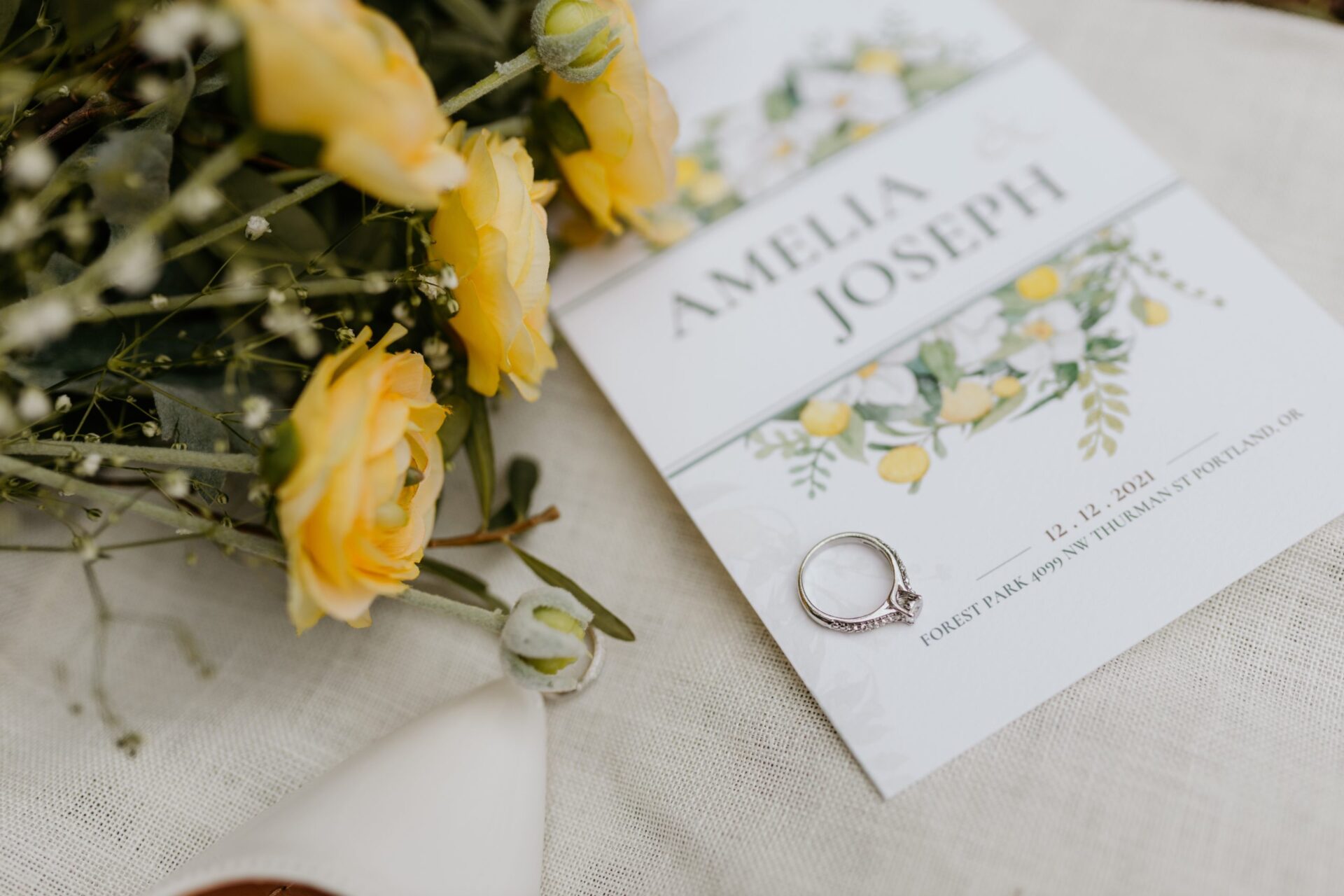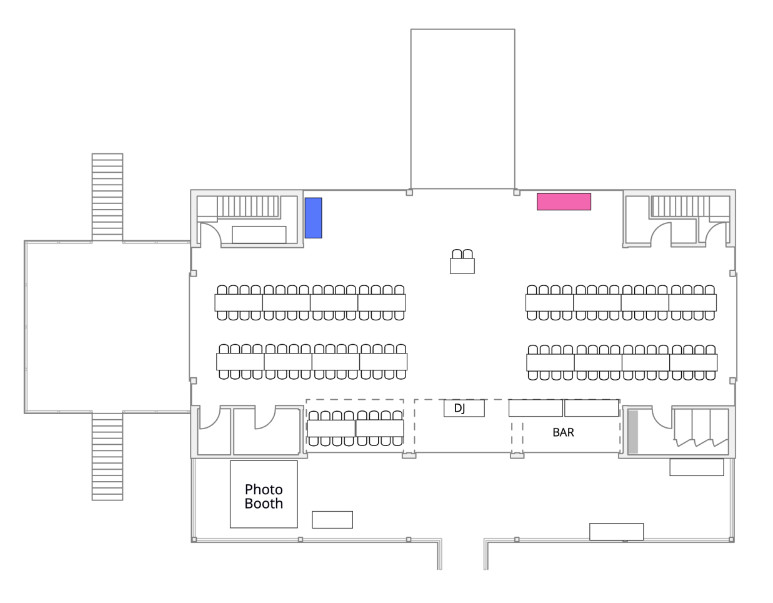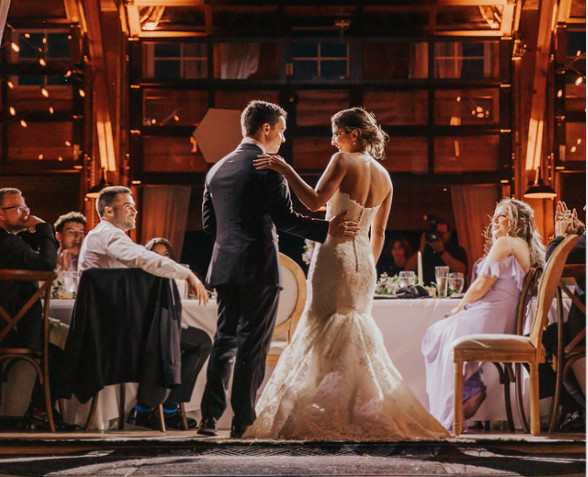By Terry Meadows
Table of Contents
7-minute read
Are you considering using a wedding planner or a wedding coordinator and wondering if it is the right decision for you? You might wonder what they do and if hiring one is worthwhile. Our wedding planner here at Zion Springs has worked with hundreds of couples at our all-inclusive wedding venue. We are sharing our knowledge and experience to help you decide if you need the services of a wedding planner and a wedding coordinator.
There is a distinction between a wedding planner and a wedding coordinator. The wedding planner is involved in the planning, design, budgeting, scheduling, communications, and logistics of your wedding from start to finish.
A wedding coordinator has a shorter timeline than the planner and usually starts about a month or a few weeks before the wedding. They are not involved in the initial planning phases, where you are determining your theme, design, and budget. They help with vendors and payments and day-of logistics, as well as supporting you on your wedding day.
In this article:
- What is a wedding planner, why do you need one, and what do they do?
- What is a wedding coordinator, why do you need one, and what do they do?
- What is the average cost of a wedding planner and coordinator?
- Questions to ask your wedding planner
What is a wedding planner?
A wedding planner is usually hired right at the start of the planning process to help couples with every aspect of their wedding. They handle all the various tasks and duties leading up to and on the wedding day. They lessen the stress for couples, and as experts in their field, they use their industry knowledge and contacts to navigate the multiple aspects of wedding planning and logistics.
4 Reasons why you might need a wedding planner?
- You don’t want the stress of planning a wedding. The whole process is fraught with negotiations and decisions that take a toll on you if you are unprepared.
- You don’t know where to start, and your organization skills are limited. You possibly feel you don’t have the expertise to bring your dreams to life.
- It takes time, both in research and communications with vendors, the venue, and guests. You might have a short time frame for planning your wedding, or you might have a busy schedule that limits your availability for the many meetings and communications with vendors.
- You are planning a destination wedding and need an expert with experience handling these.

What does a wedding planner do?
Budget management
According to The Knot’s wedding study1, 49% of couples spend an average of $6,300 more than they intended.
They help you develop a realistic budget based on your requirements and specifications. They can assist you in sticking to your budget, making the most of your budget limits, and offer suggestions on less expensive options. They track all deposits and payments for the vendors and venue.
Venue selection
They assess your wedding size, taking your budget and vision into account. Using their wealth of knowledge of wedding venues, they can suggest a venue that fits your dream event place using their wealth of knowledge of wedding venues. They accompany you on tours of wedding venues, pointing out pertinent details that support your design.
Vendor coordination
They have a curated list of top vendors from which to select your caterer, florist, photographer, videographer, bands, DJs, and furniture and tableware rentals. This saves you painstaking hours of searching for and interviewing vendors. Often, they have discounted rates for their vendors, which are passed on to you.
They attend menu tastings, offering advice and suggestions based on your theme and budget. They are also familiar with vetting vendor contracts and conducting all communications with the vendors, eliminating any discrepancies or problems that might arise.
Timeline creation
They ensure that all invoices are paid on time and alert you of upcoming deadlines. They are experienced in anticipating the time required for each aspect of your wedding plans. They communicate with the vendors, the venue, and your guests so everybody knows the what, where, and when of your wedding details.
Guest management
They handle the wedding save-the-date notices, invitations, mailings, and RSVPs. Having the guest numbers then facilitates their planning for lodging, transportation, furniture, table-setting rentals, etc. They set up the wedding website and handle all communications and postings.
They are also your first point of contact providing support for guests with problems or issues. Planners can guide you through handling difficult or unruly guests prior to the wedding, such as managing divorced parents, as well as problems on the day-of, such as drunk guests.
Design, decor, and floor plan creation
They work with the venue and rental vendors to create your vision of your wedding. Experience has taught them to assess and implement resources and know where to source them to realize your wedding vision. They use the guest list to ensure an accurate floor plan and seating chart accommodate the needs of your guests.

Zion Springs wedding reception floor plan
Day-of logistics
- Rental delivery, set-up, and breakdown
- Bride and bridesmaid styling check
- Handling emergencies
- Vendor communications
- Sound checks
- Lighting checks
- Catering and bar checks
- Transportation checks
- Photography and videography styling
- Collecting and securing gifts at the end of the day
- Distribution of gratuities for vendors and staff
What is a wedding coordinator?
The wedding coordinator is more focused on the logistics of your wedding and works on a shorter timeline than a wedding planner. Mostly, they are not involved in the early planning stages, such as setting the budget, wedding theme and design, guest communications, vendor selections, etc.
They usually come in around a month before or a few days before your wedding and take over the communications, scheduling, and execution of your plans, and completing some of the same duties as a wedding planner on your wedding day.
Some venues require a wedding coordinator. Some venues require you to use their in-house coordinator, so verify that before signing a contract with the facility.
3 Reasons You Might Need a Wedding Coordinator?
- You want to have an active role in the vision and planning of your wedding but also want to have the stress of last-minute details handled by someone else.
- You are organized and detail-oriented and want to enjoy the process while having somebody handle the logistics on your wedding day.
- You don’t have the budget for a full-service wedding planner.
What does a wedding coordinator do?
The wedding coordinator is for couples who plan and organize the majority of their wedding and are looking for support with their plans in the last month and on the wedding day. They are not part of the budgeting and design of your wedding that you organized at the start of your planning process. They focus more on the logistics as you begin your final countdown to the wedding day.
They meet with you in advance to get acquainted with your wedding plans and set up communications with your vendors and venue staff so you can hand-off to them. Then they check in with your vendors to confirm the logistics and review the contracts. They can also verify if there is anything you overlooked in your plans and help with last-minute problems.
As a coordinator, they assume the same duties listed above as a wedding planner on your wedding day, from managing the vendors to dealing with unexpected issues. They will make sure your wedding runs on schedule and according to your plans.
You might come across a “venue coordinator” which some venues require. This is a point person who represents the facility and ensures that their side of things runs smoothly. They are not involved in your wedding planning and serve more as an event coordinator on your wedding day.

What is the average cost of a wedding planner and coordinator?
You can expect to pay 7-20% of your total wedding budget on a wedding planner, depending on the length of your wedding and the involvement required of the planner. Ensure you verify and clearly understand what duties they will perform before you hire them.
You need to determine if a wedding planner or coordinator fits your budget. Is the stress and logistics of planning your wedding enough to warrant hiring their services and expertise? They can bring experience and industry knowledge to the table, and you need to decide if it is advantageous for you to use a wedding planner, especially if you plan on having a large wedding or a destination wedding.
If you choose an all-inclusive wedding venue, your wedding planner is possibly included in the package. Shop around, as some venues claim to be all-inclusive but don’t include a wedding planner.
Questions to ask your wedding planner
To help you choose a wedding planner, download the link, and take these questions with you to the interview.
Questions for meeting with your wedding planner
- Are you available on my wedding date?
- What sorts of services do you offer? Month-of coordination, full-service planning, or à la carte planning
- Do you offer planning services for additional weekend events, such as rehearsal dinner or welcome gathering?
- How many weddings have you planned?
- How many weddings will you be working on simultaneously? (Day-of and throughout the entire process)
- What are your primary areas of expertise?
- Have you planned any other weddings at our site?
- What's your secret for staying calm under pressure, and how do you deal with day-of disasters?
- When things inevitably go slightly awry on my wedding day, what does your process look like to get them back on track?
- Do you have references? (Testimonials from both professionals and recent couples.)
- What will the planning process look like? How many meetings will we have, and how will we be involved?
- How do you prefer to communicate?
- Do you handle professional services, contracts, and payment processing?
- Can you walk us through the process of selecting other vendors and how we would be involved?
- Are you willing to step in as our advocate, conveying our visions and desires to pros when we can't?
- Will you handle the invitations, from wording and ordering to addressing and mailing? What about guest list coordination and RSVPs?
- Do you handle rentals? Will you coordinate delivery, arrival, and set-up times with the photographer, the florist, the musicians, and the caterer/banquet manager?
- How many people on your staff will be at the wedding?
- Can you create a timeline that tells everyone involved in the planning process (other pros, members of the wedding party, to-be-weds, and families) what to do and when to do it? How will you make sure everyone sticks to the schedule?
- What happens if you're sick or unable to be there on our wedding day?
- What is the average wedding budget for the couples you serve?
- Can you work within our budget?
- Will you help me build and prioritize my budget?
- How do payments work (a percentage of our budget, a flat fee)?
- Will there be additional expenses besides your base fee (travel, parking, food)?
- Do you carry personal liability and professional indemnity insurance?
- Can we see some of your past work from real weddings?
- Can you tell me about a past wedding that was a particular favorite for you? Why were they memorable to you?
- What was the most unique wedding you ever planned?
- What are some ideas you have for pulling off our vision?
- What sets you apart from your peers and differentiates your company?
- What are your company's values and why? How do they translate into the work you do?
- Can you tell me more about the structure of your team and business?
- What are some things that I can do to be sure our working relationship runs smoothly?
Is a wedding planner and coordinator right for you?
You might wonder if hiring a wedding planner is for you. You can plan a wedding without a wedding planner as long as you are organized and detail-oriented.
If you feel that you need the support and guidance of a wedding planner, look for professionals who belong to a national association, such as Wedding Industry Professionals Association. Their knowledge and experience can relieve the stress and time-consuming wedding planning demands.
Having a wedding planner might sound like an awesome option, but might be "one more thing" you have to pay for. Some venues require you to use their in-house venue/wedding coordinator, and this is an extra fee.
You might be curious about a wedding planner that is included with an all-inclusive wedding venue. It could be one way for you to save money while removing the stress of planning and organizing your wedding.
At Zion Springs, we have over 400 weddings of experience and want to share our knowledge with you so you are better prepared for your own wedding. Our articles cover subjects like Wedding day mistakes and how to fix them and Realistic Wedding day timelines. Check out our many articles on our Answers & Advice page.

DJ and Corey’s Summer Wedding

Isabel and Gunter’s Winter Wedding

Rachel and Daniel’s Spring Wedding



